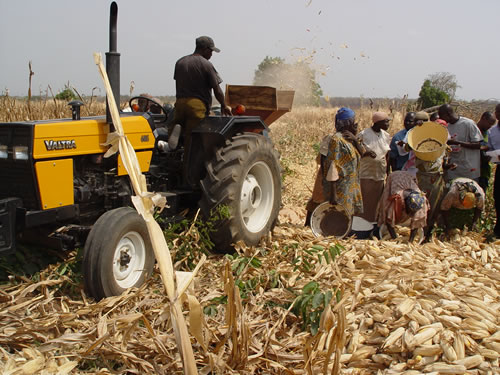An agriculturist, Dr Tunde Arosanye, has described post-harvest losses of agricultural produce as a major challenge facing efforts to achieve food security in Nigeria.
Arosanye, the Technical Adviser of the All Farmers Association of Nigeria (AFAN), made the observation in an interview with News Agency of Nigeria (NAN) in Abuja on Friday.
He said that post-harvest losses of agricultural produce were due to inadequate processing and storage facilities and bad road networks in the country.
He stressed that factors such the dearth of storage and agro-processing facilities, poor value chain system and marketing channels as well as ageing farmers had hampered the country’s agricultural development, thereby hindering food security.
Arosanye said that even though Nigeria was the world’s largest producer of agricultural produce like cassava, tomatoes and cashew, among others, over 60 per cent of the produce never got to market because of post-harvest losses.
He estimated the losses to be in the region of between 30 and 45 per cent of their harvests.
“The produce, which are mostly affected, are vegetables and fruits that are easily perishable and this has discouraged production, particularly during the harvest stages.
“The losses also cut across the tuber family like cassava, yam, and potatoes and the only area where losses are reduced are the cereals family like rice,’’ he said.
Arosoyin noted that in recent times, the country’s food production had been somewhat static because the struggling smallholder farmers, who worked very hard to plant different kinds of crops and harvest them, had no markets or profit guarantee for their produce.
He, however, said that the low agricultural production could also be attributed to the high number of aged farmers, while many youths were not interested to go into farming due to the crude methods of farming.
The agricultural expert urged the government to start working on strategies that could engender the replacement of the aged farmers, while restructuring the university curriculum to enable students to start choosing agriculture as the main course rather than an optional course.
Arosayin said that in efforts to guard against post-harvest losses of agricultural produce, the government should put in place a pricing mechanism for all farm products and create a margin of 20 to 30 per cent income for farmers per tonne of produce.
He said that this could be achieved by providing buffer funds to stabilise the prices of farm produce and encourage farmers to produce more.
Arosayin also underscored the need for the government to reactivate all the silos across the country and make them functional.
“If government can have silos in all 774 local government areas and maintain them, it will go a long way to boost agricultural production; we can have at least one silo in each of the 109 senatorial districts to facilitate the storage of grains.
“With this in place, the Federal Government can buy produce at the point of harvest at a breakeven price to create profit for the farmers,’’ he said.
He said that the government should process the grains and store them in the silos, adding that as regards perishable items, government should set up cold room silos to store items like fresh milk, tomatoes, mangos, cashew, among others, just like what obtained in the advanced countries.
Arosanyin said that government could then subsidise the prices of the produce for agricultural companies to buy and process.
He added that this cycle of events would be beneficial as it would tackle the growing menace of post-harvest losses of agricultural produce in a pragmatic way. (NAN)

